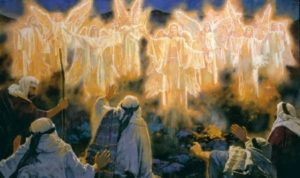
FREE Short Story: The Seamstress
For your FREE short story, type your email address below.
You'll get the short story, plus fun facts about the Wild West, and news about upcoming stories.

For your FREE short story, type your email address below.
You'll get the short story, plus fun facts about the Wild West, and news about upcoming stories.
‘8 And there were shepherds living out in the fields nearby, keeping watch over their flocks at night. 9 An angel of the Lord appeared to them, and the glory of the Lord shone around them, and they were terrified. 10 But the angel said to them, “Do not be afraid. I bring you good news that will cause great joy for all the people. 11 Today in the town of David a Savior has been born to you; he is the Messiah, the Lord. 12 This will be a sign to you: You will find a baby wrapped in cloths and lying in a manger.”
13 Suddenly a great company of the heavenly host appeared with the angel, praising God and saying,
14 “Glory to God in the highest heaven,
and on earth peace to those on whom his favor rests.”
15 When the angels had left them and gone into heaven, the shepherds said to one another, “Let’s go to Bethlehem and see this thing that has happened, which the Lord has told us about.”
16 So they hurried off and found Mary and Joseph, and the baby, who was lying in the manger. 17 When they had seen him, they spread the word concerning what had been told them about this child, 18 and all who heard it were amazed at what the shepherds said to them. 19 But Mary treasured up all these things and pondered them in her heart. 20 The shepherds returned, glorifying and praising God for all the things they had heard and seen, which were just as they had been told.‘ LUKE 2:8-20
It’s such a special part of the Christmas story, and most of us know it practically by heart. We remember taking part in nativity plays as children, wearing bathrobes, and tea towels on our heads, or trying to keep our tinfoil wings straight.
But why did the angels come to the shepherds first? They wouldn’t have been my first choice to tell of the birth of a child. We usually announce such news to relatives, then close friends, then our community.
We may have heard explanations relating to how the shepherds were the lowest of the low in the society of Jesus’ day. They were the rubbish collectors, the gypsies, the vagrants of their time: smelly, coarse, and repulsive. And it was to these outcasts that God brought the Good News first. He wanted to demonstrate that His Love, coming as the gift of His Son, was for everyone, deserving and undeserving.
This is a good explanation, but I had another thought. According to Luke, there was a whole host of angels, making a lot of noise and fanfare. They would have needed a big space to put on such a show, and where better than the open fields and hillsides near Bethlehem? The angels were praising God for His great deeds, spontaneous and effusive in their joy.
And what were those shepherds doing? ‘Keeping watch … at night.’ While the rest of the world was going about its business – trading, shopping, partying, arguing, travelling on donkeys, taking censuses (censii?) – the shepherds were watching. They may have been the only ones that night not absorbed by the many distractions of life. They were the only ones to actually notice the angels’ extravaganza.
The Good News that the angels proclaimed was for everyone, but the shepherds were the ones who noticed, paid attention to the message, and acted on it.
Let’s take time out to listen to the message, free from distractions.
